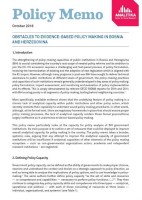Obstacles to Evidence-Based Policy Making in Bosnia And Herzegovina
Obstacles to Evidence-Based Policy Making in Bosnia And Herzegovina
Author(s): Not Specified Author
Subject(s): Politics, Civil Society, Government/Political systems, Politics and law
Published by: Analitika – Centar za društvena istraživanja
Keywords: BiH; evidence; policy making; obstacles;
Summary/Abstract: The strengthening of policy-making capacities of public institutions in Bosnia and Herzegovina (BiH) is crucial considering the country’s vast scope of needed policy reforms and its ambition to join the EU. EU accession requires a challenging and fast-paced process of policy formulation, involving the harmonization of existing and the adoption of new legislation which is aligned with the EU acquis. However, although many programs in post-war BiH have sought to deliver technical assistance to public institutions at different levels of government, the policy-making practices and capacities of such institutions remain generally underdeveloped in key areas of policy making: policy formulation, impact assessment, and monitoring and evaluation of policy implementation and its effects. This is amply demonstrated by relevant OECD SIGMA reports for 2015 and 2017, with BiH scoring poorly in all segments of policy making, trailing behind neighboring countries. More specifically, available evidence shows that the underlying feature of policy making is a chronic lack of analytical capacity within public institutions and other policy actors, which severely restricts their capability to undertake sound policy making procedures. In other words, although, at the formal level, there are regulatory frameworks in place that should ensure proper policy making processes, the lack of analytical capacity renders those formal preconditions largely ineffective as it undermines evidence-based policy making. This policy memo particularly looks at the capacity for policy analysis of BiH government institutions. Its main purpose is to outline a set of measures that could be deployed to improve overall analytical capacity for policy making in the country. The policy memo takes a broader, systemic view, arguing that any attempt to improve the analytical capacity of government institutions will be insufficient if analytical capacities of other elements of the policy making ecosystem – such as non-governmental organizations actors, academia and independent research institutions – are neglected.
Series: Analitika - Policy Memo
- Page Count: 14
- Publication Year: 2018
- Language: English
- Content File-PDF
- Introduction

